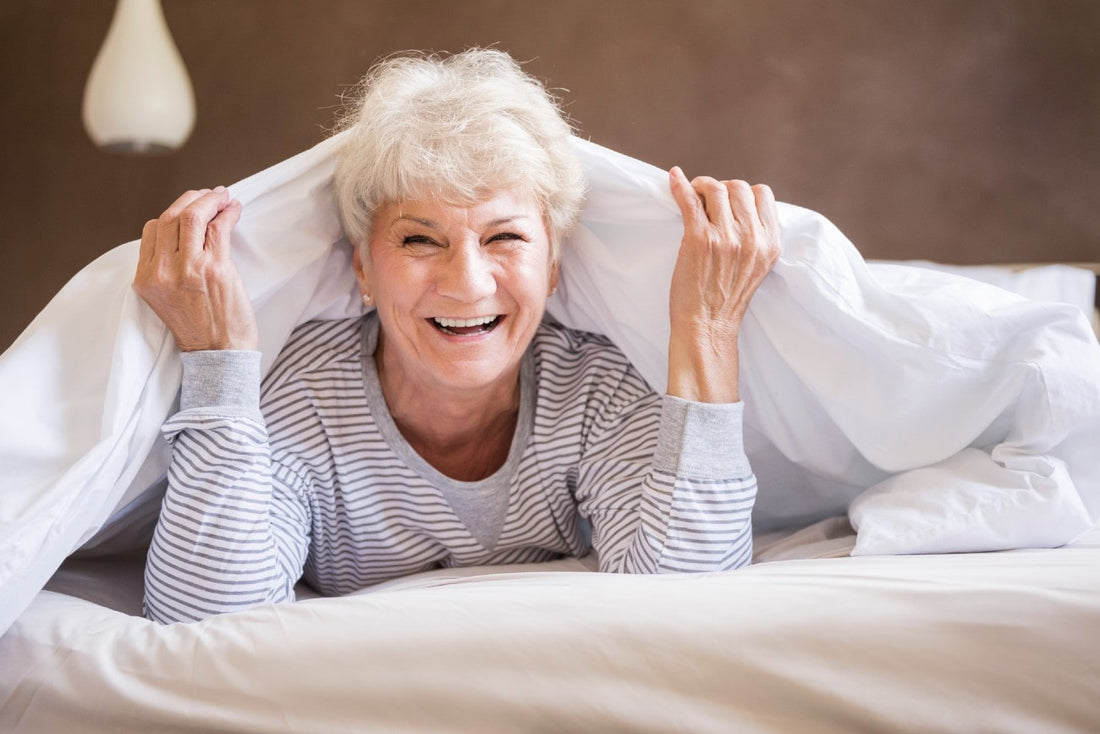Sleep and Aging: How Your Sleep Changes as You Get Older

Sleep is a critical component of our well-being, impacting our physical health, cognitive performance, emotional balance, and general quality of life. A good night's sleep allows us to wake up feeling refreshed, revitalized, and ready to face the day. However, as we progress through life, our sleep habits change, which can have a substantial impact on the quality and duration of our sleep. The purpose of this post is to delve into the intriguing relationship between sleep and aging, shedding light on how our sleep varies as we age and examining its significant implications for our overall well-being.
A good night's sleep is essential for people of all ages, but it gets increasingly important as we age. Sleep allows our bodies to heal and renew, consolidate memories, and regulate vital bodily processes. While the required quantity of sleep remains relatively steady throughout adulthood, often ranging between 7-9 hours each night, how we perceive and achieve that sleep might change over time.
Understanding the changes that occur requires a fundamental understanding of sleep. Sleep is a complicated process that includes several stages and cycles that occur throughout the night. These stages, known as non-rapid eye movement (NREM) and rapid eye movement (REM) sleep, collaborate to support a variety of vital processes. NREM sleep is divided into three stages: N1, which is a transition stage between wakefulness and sleep; N2, which is characterized by light sleep and the onset of sleep-specific brainwave activity; and N3, which is also known as deep sleep or slow-wave sleep and is essential for physical restoration and repair. REM sleep, on the other hand, is linked to vivid dreams and is essential for cognitive processing and emotional regulation.
Sleep Changes in Older Adults
Our sleep patterns gradually change as we become older. Sleep fragmentation is common in older adults, with repeated awakenings throughout the night. These awakenings can be triggered by a variety of circumstances, including underlying medical issues, discomfort, pain, or a need to use the restroom (nocturia) and etc. Fragmented sleep can reduce the amount of deep, restorative sleep experienced, leaving people feeling tired in the morning.
Aging can also cause a shift in sleep-wake cycle timing, resulting in an earlier bedtime and wake-up time. This condition is known as advanced sleep phase syndrome. In the early evening, older individuals may feel sleepy and ready for bed, and they may wake up relatively early in the morning. While this change in sleep timing may be a natural result of aging, it can interrupt social activities and limit exposure to natural light, which helps regulate the circadian rhythm, the internal biological clock that regulates sleep-wake cycles. To control our sleep-wake patterns, our circadian rhythm is dependent on a complex mix of hormones and environmental stimuli. However, with age, this delicate balance may be disrupted, and this shift can make it challenging to maintain a consistent sleep schedule and may contribute to feelings of restlessness during the night or early morning awakenings.
The amount of time spent asleep compared to the amount spent in bed is referred to as sleep efficiency. Sleep efficiency tends to decline in older adults, with more extended periods awake in bed. Age-related changes in sleep architecture, increased vulnerability to external disturbances, and the presence of medical diseases can all contribute to decreased sleep efficiency. As a result, older people may spend more time in bed attempting to sleep yet getting less sleep.
Changes in the structure of sleep are connected with aging. With age, the amount of time spent in deep N3 sleep, also known as slow-wave sleep, decreases. This decrease in deep sleep may have an effect on the bodily restoration and repair processes that occur during sleep. Furthermore, alterations in the distribution and length of REM sleep may occur, resulting in fewer and shorter REM sleep episodes. These changes can have an impact on cognitive processing, emotional control, and memory consolidation, as well as cause daytime sleepiness or exhaustion.
Aside from age-related sleep changes older adults are more vulnerable to specific sleep disorders. Insomnia, defined as difficulty falling or staying asleep, becomes more common as we age. Sleep apnea, a disorder characterized by disrupted breathing while sleeping, also tends to worsen with age. Other sleep problems typically reported in older persons include restless legs syndrome, which manifests as an irrepressible urge to move the legs, and periodic limb movement disorder, which is characterized by involuntary limb movements during sleep.
Factors Contributing to Sleep Changes in Aging
Our internal biological clock, the circadian rhythm, aids in the regulation of the sleep-wake cycle. The circadian rhythm, however, has a natural tendency to alter with age. Melatonin, the hormone that promotes sleep, is generally released earlier in older adults, resulting in earlier bedtimes and waking hours. This change can make it difficult to keep a normal sleep schedule, resulting in sleep issues. Aging is linked to changes in hormone production, which can impact sleep. Changes in hormone levels, such as lower estrogen and testosterone, can, for example, lead to sleep disruptions in both men and women.
Older people are more likely to have underlying medical issues that interfere with sleep. Arthritis, chronic pain, heart illness, respiratory disorders, and neurological conditions can all cause discomfort or pain, making it difficult to fall or stay asleep. Sleep can also be disrupted by conditions such as gastroesophageal reflux disease (GERD) or nocturia (nocturnal urination).
To manage various health issues, older folks frequently take many drugs. Certain medications can cause sleep disturbances. Some medications, for example, for high blood pressure, heart disease, and mood problems, might impair sleep quality. It is critical to research medication profiles and speak with healthcare experts about potential sleep-related adverse effects.
Changes in lifestyle and daily habits might have an impact on sleep in older adults. Reduced physical activity, inconsistent sleep schedules, increased daytime napping, and excessive daily sedentary behavior can all have an impact on sleep quality. Furthermore, substance usage, including caffeine and alcohol use, can disrupt sleep patterns and cause sleep disruptions.
Sleep in older individuals can also be influenced by psychological and emotional variables. Stress, anxiety, and despair are all frequent later-life situations that can affect sleep patterns. Sleep problems may be exacerbated by emotional and cognitive obstacles associated with aging, such as loneliness or cognitive impairment. Noise, temperature, and light exposure can all have an impact on sleep quality in older people.
Understanding the consequences of inadequate sleep in older adults is critical. Sleep deprivation can have serious health repercussions, increasing the risk of chronic diseases like cardiovascular disease, diabetes, and obesity. Inadequate sleep is also linked to cognitive impairment, memory problems, and an increased vulnerability to neurodegenerative illnesses. Sleep issues can also have a negative impact on mental health, contributing to mood disorders including despair and anxiety.
Strategies for Healthy Sleep in Aging
Implementing healthy sleep techniques is critical for supporting adequate sleep quality in aging adults. Older people can enhance their sleep patterns and overall well-being by using good sleep practices. Let's look at some techniques for encouraging healthy sleep in aging:
Maintain a Regular Sleep Schedule
A regular sleep pattern aids in the regulation of the body's internal clock and promotes better sleep. Even on weekends, try to go to bed and wake up at the same time every day. The body's normal sleep-wake cycle is reinforced by consistency, making it simpler to fall asleep and wake up refreshed.
Make Your Environment Sleep-Friendly
Make sure your sleeping environment is comfortable, quiet, dark, and cool. Purchase a supportive mattress and pillows that meet your needs. To block off extra light, use curtains, blinds, or eye masks. To reduce distracting noises, use earplugs, white noise devices, or fans. Maintaining a sleep-friendly environment promotes calm and uninterrupted sleep.
Practice Relaxation Techniques
Relaxation practices might help to prepare the body and mind for sleep. Deep breathing techniques, progressive muscular relaxation, meditation, or mild stretching can all assist to reduce tension and improve peace. Include these tactics in your evening routine to communicate to your body that it's time to unwind and prepare for sleep.
Engage in Regular Physical Activity
Regular exercise during the day can help you sleep better at night. Engaging in moderate-intensity cardiovascular exercises for at least 30 minutes most days of the week, such as walking, swimming, or cycling, will improve sleep. However, strenuous exercise should be avoided too close to night because it may enhance awareness and make falling asleep more difficult.
Practice Good Sleep Hygiene
Establishing appropriate sleep hygiene routines can help you sleep better. Maintain a bedtime routine that includes activities such as reading a book, having a warm bath, or listening to soothing music. Avoid stimulating activities and electronic gadgets near bedtime since the blue light released by screens can disrupt the sleep hormone melatonin.
Address Underlying Sleep Disorders
If you are having persistent sleep problems, it is critical that you get expert assistance. A sleep specialist can assess your sleeping habits and identify any underlying sleep issues. Cognitive-behavioral therapy for insomnia (CBT-I), which addresses negative sleep attitudes and behaviors, and medication therapies for particular sleep disorders are two treatment alternatives.
Optimize Bedroom for Sleep
Make your bedroom a sleep-friendly space. Keep it clutter-free, comfortable, and solely dedicated to sleep and intimacy. Minimize distractions and use blackout curtains or blinds to create a dark environment. Adjust the room temperature to a cool, comfortable level that promotes sleep. Consider using a comfortable eye mask or earplugs if necessary.
Limit Stimulants and Alcohol
Caffeine and nicotine, for example, are stimulants that might interfere with sleep. Consuming them close to bedtime can interfere with sleep commencement and quality. Furthermore, while alcohol may cause drowsiness at first, it can disturb the sleep cycle, resulting in fragmented and less restorative sleep. Limit your alcohol consumption and give enough time for its effects to wear off.
You may improve your sleep quality and general well-being by implementing these practices into your everyday routine. Remember that everyone's sleep needs are different, so listen to your body and tailor these tactics to your personal needs.
It is critical to seek medical assessment and diagnosis if sleep issues persist or have a major impact on daily functioning. Consultation with healthcare medicine professionals who specializes in sleep medicine can provide significant insights as well as appropriate treatment options. Sleep tests, such as polysomnography, can aid in the correct diagnosis and evaluation of sleep problems. Continuous positive airway pressure (CPAP) therapy for sleep apnea, prescription alternatives for specific sleep disorders, or referral to specialized sleep clinics are all possible treatment approaches.
Ultimately, understanding how our sleep varies as we get older is critical for sustaining good health and well-being. Aging causes changes in sleep architecture, changes in circadian rhythm, and an increased risk of sleep disorders. Older adults can proactively address sleep-related difficulties and pave the path for better sleep and overall quality of life by prioritizing healthy sleep practices, using non-pharmacological techniques, and seeking professional help when necessary.
References
https://www.sleepfoundation.org/aging-and-sleep
https://learn.aasm.org/Listing/a1341000002XmRvAAK
https://www.ncbi.nlm.nih.gov/pmc/articles/PMC3902880/
https://www.sciencedirect.com/science/article/abs/pii/S0140673611607502
https://pubmed.ncbi.nlm.nih.gov/20308755/
https://www.researchgate.net/publication/265343525_Impact_of_Sleep_on_the_Risk_of_Cognitive_Decline_and_Dementia
https://www.healthinaging.org/aging-and-health-a-to-z/topic:sleep-problems-in-older-adults/










